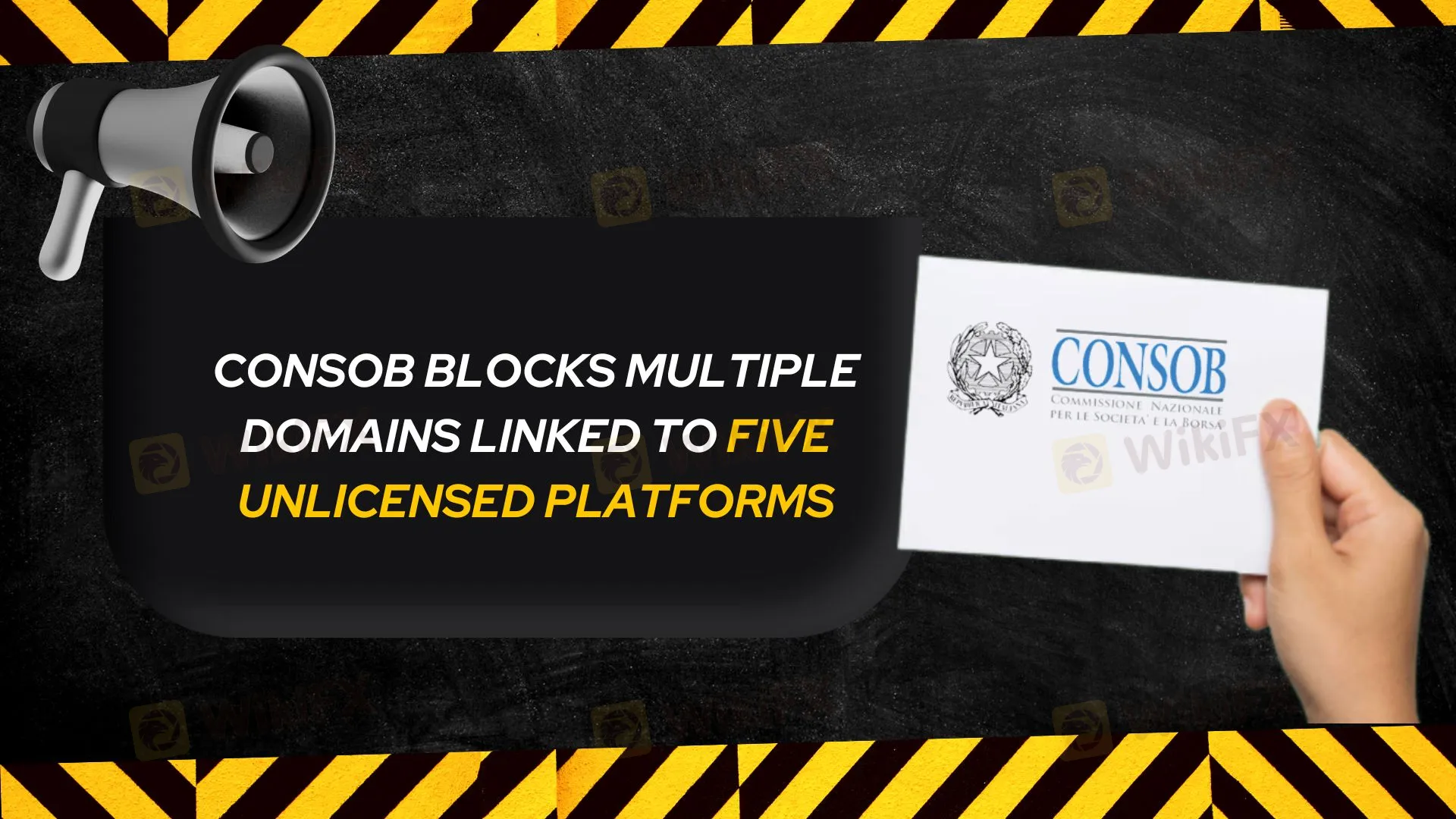简体中文
繁體中文
English
Pусский
日本語
ภาษาไทย
Tiếng Việt
Bahasa Indonesia
Español
हिन्दी
Filippiiniläinen
Français
Deutsch
Português
Türkçe
한국어
العربية
CONSOB Blocks Multiple Domains Linked to Five Unlicensed Platforms
Abstract:A new wave of unlicensed investment platforms has been identified by Italian regulators. These sites often mimic real brokers, making it crucial for investors to confirm regulatory status through trusted sources like WikiFX.

Italys financial regulator CONSOB has moved to restrict access to five online platforms found to be operating without authorization. These websites, presenting themselves as legitimate financial service providers, were offering investment products to Italian users in violation of local regulations.
The following platforms have been flagged and are now subject to access restrictions within Italy:
- Fibonachis – fibonachis.com and webtrader.alynto.tech
- PrimeXMarkets Ltd – primexmarkets.com and client.primexmarkets.com
- Blyx Ultra – blyxultra.com, blyxultraltd.com, and cfd.platformt121-3-3.com
- State Street Markets Limited – streetstate.vip
- EXT24 – ext24.co and my.ext24.co
According to CONSOB, these platforms have been offering financial or trading services to the Italian public without holding any regulatory license. Some display sophisticated web design and trading interfaces to appear credible, while lacking any formal oversight or compliance with EU investment laws.
The access restriction, enforced through Italys “Growth Decree,” empowers CONSOB to request internet providers to block unlicensed financial websites. Although implementation by ISPs may take several days, investors are strongly advised to avoid engaging with any of the listed domains.
This latest action adds to a growing list of over 1,300 platforms that have been blacked out by CONSOB since it was granted web-blocking authority. The increasing prevalence of such cases highlights the need for stronger awareness and verification before investing online.
Investors are reminded that appearance does not equal legitimacy. Many fraudulent websites mimic the branding of real financial institutions, promise unusually high returns, or pressure users into quick decisions.
To stay safe, always verify the regulatory status of a platform before depositing funds. Tools like WikiFX can help you identify whether a broker holds a valid license, what jurisdiction it falls under, and how it has been reviewed by other users. Avoid platforms not listed in official registries, and be especially wary of unsolicited offers received via social media, messaging apps, or email.
If you suspect a platform may be fraudulent, report it promptly to the relevant authorities—and consult reliable resources before taking any investment action.
Disclaimer:
The views in this article only represent the author's personal views, and do not constitute investment advice on this platform. This platform does not guarantee the accuracy, completeness and timeliness of the information in the article, and will not be liable for any loss caused by the use of or reliance on the information in the article.
Read more

RM4.8 Million Gigamax Scandal: Investors Still Waiting for Answers
Questions are growing over the lack of updates from police after the arrest of three people believed to be behind the Gigamax investment scam. The arrests, which took place at Kuala Lumpur International Airport (KLIA) on 6 May, have raised hopes among victims but silence from the authorities has led to fresh concern.

International Operation Shuts Down €3M Fake Trading Platform
A coordinated international operation has shut down a fake trading scam, preventing further fraud after defrauding victims of €3M across five countries.

BaFin Issues Series of Warnings Against Unlicensed Financial Websites Exploiting German Consumers
Germany’s Federal Financial Supervisory Authority (BaFin) has issued a series of public warnings on May 14, 2025, targeting at least five unlicensed financial websites that are allegedly offering unauthorized services to German consumers. These include dvagk.de, valuewanderer.com, quinvexcaptial.com, market-z.com, and europrofitspro.com.

Judge Reviews Sanctions Against CFTC in My Forex Funds Fraud Case
A New Jersey judge reviews sanctions against the CFTC after a special master accused the agency of bad faith in its fraud case against My Forex Funds and CEO Kazmi.
WikiFX Broker
Latest News
FIBO Group Review 2025: Is This Forex Broker a Scam or Legit?
The Forces That Move Markets & How to Read Them
Trade Nation 2025 Review: Spreads, Platforms, FCA and ASIC Licenses
CNMV Warns of Clone Sites Targeting EU Investors
CONSOB Blocks Multiple Domains Linked to Five Unlicensed Platforms
Gold Suffers Largest Drop in Six Months — What’s Next?
Currency Calculator


